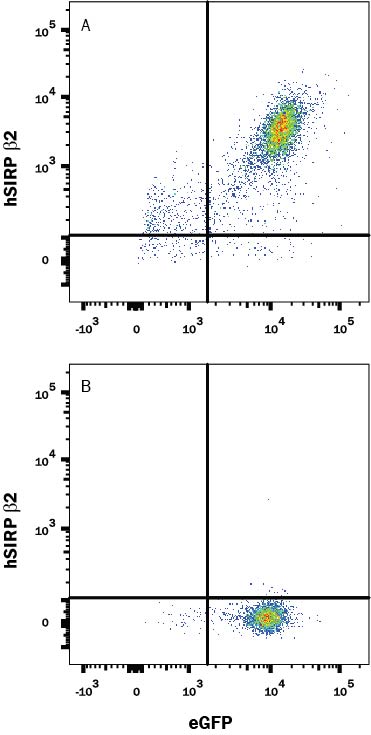Human SIRP beta 2 Antibody Summary
Gln33-Gly287
Accession # Q5JXA9
Applications
Please Note: Optimal dilutions should be determined by each laboratory for each application. General Protocols are available in the Technical Information section on our website.
Scientific Data
 View Larger
View Larger
Detection of SIRP beta 2 in HEK293 Human Cell Line Transfected with Human SIRP beta 2 and eGFP by Flow Cytometry. HEK293 human embryonic kidney cell line transfected with (A) SIRP beta 2 or (B) irrelevant protein, and eGFP were stained with Mouse Anti-Human SIRP beta 2 Monoclonal Antibody (Catalog # MAB99981) followed by Allophycocyanin-conjugated Anti-Mouse IgG Secondary Antibody (Catalog # F0101B). Quadrant markers were set based Mouse IgG2B Isotype Control Antibody staining (Catalog # MAB0041, data not shown). View our protocol for Staining Membrane-associated Proteins.
 View Larger
View Larger
Detection of SIRP beta 2 in THP-1 Cells by Flow Cytometry. THP-1 monocytic leukemia cell line was stained with Mouse Anti-Human SIRP beta 2 Monoclonal Antibody (Catalog # MAB99981, filled histogram) or Mouse IgG2B Isotype Control Antibody (Catalog # MAB0041, open histogram) followed by Allophycocyanin-conjugated Anti-Mouse IgG Secondary Antibody (Catalog # F0101B). View our protocol for Staining Membrane-associated Proteins.
Reconstitution Calculator
Preparation and Storage
- 12 months from date of receipt, -20 to -70 °C as supplied.
- 1 month, 2 to 8 °C under sterile conditions after reconstitution.
- 6 months, -20 to -70 °C under sterile conditions after reconstitution.
Background: SIRP beta 2
Signal-regulatory protein beta-2(SIRP-beta-2), is a ~37 kDa monomeric single pass type I membrane glycoprotein. It belongs to the SIRP/SHPS (CD172) family of the immunoglobulin (Ig) superfamily (1). The SIRP family are paired receptors that have similar extracellular domains but differing C-terminal domains and functions (1). SIRP-beta-2 contains an N-terminal signal peptide (aa1-32), two extracellular Ig-like domains: a V-type 1 (aa 33-143) and a V-type 2 (aa 157-258) containing three potential N-linked glycosylation sites, a helical transmembrane domain (aa 288-308), and a cytoplasmic domain (aa 309-342) (1). A positively charged residue within the transmembrane domain, in analogy to SIRP-beta-1, is implicated to mediate interaction with the adaptor DAP12 protein, which contains immunoreceptor tyrosine-based activation motifs (ITAMs) (2). Proteins in the SIRP family are typically expressed in immune cells, especially in the myeloid lineages (3). Based on expression patterns, SIRPs are thought to have roles in immune regulation (4). SIRP family members role in innate immunity and host defense has potential significance as a therapeutic target in cancer and inflammation (5, 6). There are currently no known mouse or rat homologs for this protein.
- van Beek, E.M. et al. (2005) J. Immunol. 175:7781.
- Liu, Y. et al. (2005) Journal of Biological Chemistry. 280:36132.
- Matozaki, T. et al. (2009) Trends in Cell Biology. 19:72.
- Barclay A.N. et al. (2006) Nat Rev Immunol. 6:457.
- Barclay A.N. et al. (2014) Annu Rev Immunol. 32:25.
- Veillette A. (2018) Trends Immunol. 39:173.
Product Datasheets
FAQs
No product specific FAQs exist for this product, however you may
View all Antibody FAQsReviews for Human SIRP beta 2 Antibody
There are currently no reviews for this product. Be the first to review Human SIRP beta 2 Antibody and earn rewards!
Have you used Human SIRP beta 2 Antibody?
Submit a review and receive an Amazon gift card.
$25/€18/£15/$25CAN/¥75 Yuan/¥2500 Yen for a review with an image
$10/€7/£6/$10 CAD/¥70 Yuan/¥1110 Yen for a review without an image

